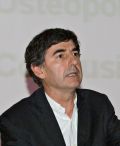 |
||
Accueil > FORUM TERATEC > Programme > Atelier 2
Abstract : Around 20% of the population over 60 years old have peripheral arterial disease, and in a fifth of them symptoms can become severe and progressive, causing major lifestyle limitation; in many of these cases a stent can solve the problem effectively. The risk of stent rupture is becoming an increasing source of concerns for devices placed in peripheral arteries (this risk could affect 30% of the patients). We aim to develop and validate a sophisticated patient-specific model of the fatigue-fracture of a stent, integrated in a computer-aided surgery planning application, implemented to run in real-time during the surgical planning, so as to provide advice of the risk of stent rupture while the surgeon is planning the operation.
The technological pillars of this development are:
- Finite element simulation of the angioplasty including stent deployment, axial and bending fatigue cycles.
- Definition of large variation anatomical parameters representing the human variability.
- Reduced order model techniques to accurately parameterize simulation results.
- HPC techniques to manage thousands of large runs.
- Web application to review results in real time.
The project RT3S (Real Time Simulation for Safer Vasclar Stenting) was partially funded by EU (FP7 - ICT for patient safety) and the main partners were Politecnico di Milano, Medtronic, Cineca, University of Sheffield and Ansys.
|
![]() La participation à cet atelier est gratuite sous réserve des places disponibles
La participation à cet atelier est gratuite sous réserve des places disponibles
![]() L'enregistrement en ligne est obligatoire pour y assister. Cliquer ICI pour vous inscrire.
L'enregistrement en ligne est obligatoire pour y assister. Cliquer ICI pour vous inscrire.
